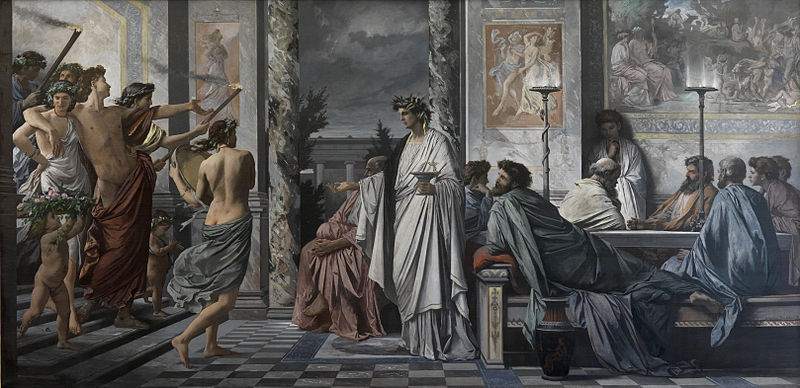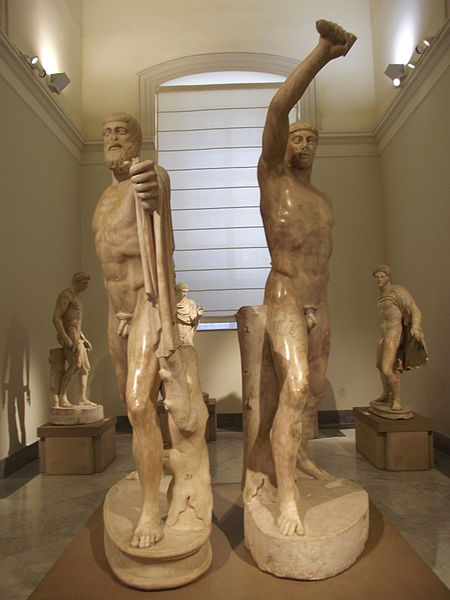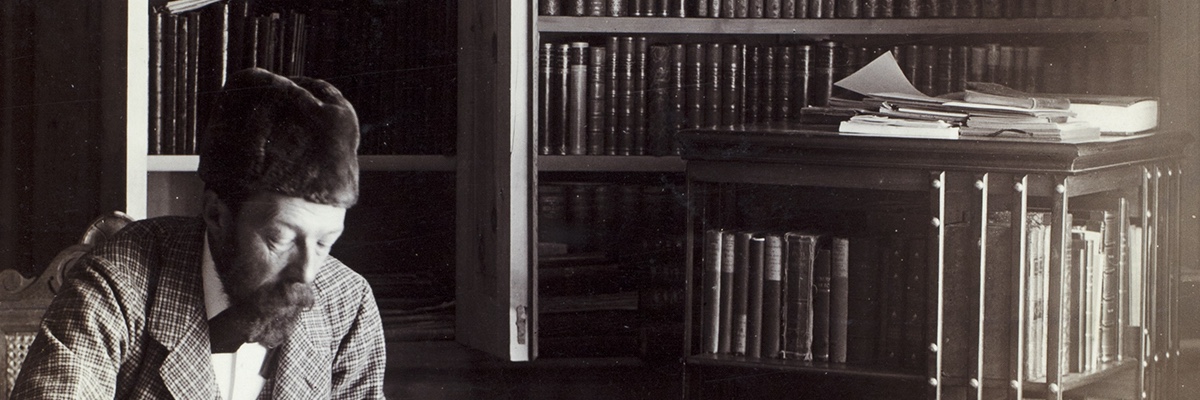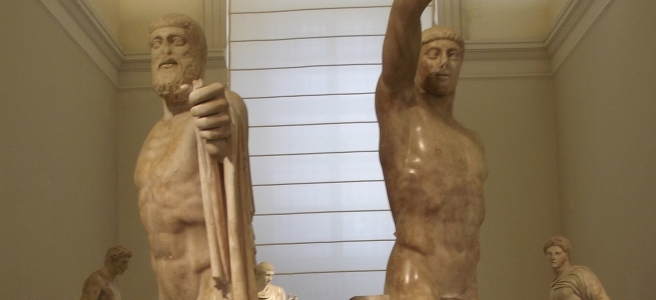Symonds documented an early interest in Greek literature in his Memoirs, when he described being particularly struck by figures such as Shakespeare’s Adonis and Homer’s Hermes, working his way up to writers including Plato, who deeply impacted him when he began his study of him:
Here in the Phaedrus and Symposium — in the Myth of the Soul and the speeches of Pausanias, Agathon, and Diotima — I discovered the true Liber Amoris [Book of Love] at last, the revelation I had been waiting for, the consecration of a long-cherished idealism.
The Memoirs of John Addington Symonds, 152

In the Symposium, Pausanias, one of the speakers Symonds references, contradicts Phaedrus’ description of love, claiming he ought to have distinguished between heavenly and earthly — or heavenly and common — love (Plato, xx). There are, Pausanias claims, two Aphrodites: the heavenly one born from Uranus, who represents an intelligent, noble form of love, and the younger, common Aphrodite born from Zeus and Dione, who represents a perverted lust that is merely a love of the body, not of the soul (Plato, xx).
These two separate forms of love are referenced by Symonds in A Problem in Greek Ethics in his discussion of paiderastia; he describes “two separate forms of masculine passion clearly marked in early Hellas—a noble and a base, a spiritual and a sensual. To the distinction between them the Greek conscience was acutely sensitive” (Problem, section VI). His focus then shifts specifically to the “nobler type of masculine love” the Greeks practiced, stating:
The immediate subject of the ensuing inquiry will, therefore, be that mixed form of paiderastia upon which the Greeks prided themselves, which had for its heroic ideal the friendship of Achilles and Patroclus, but which in historic times exhibited a sensuality unknown to Homer. In treating of this unique product of their civilisation I shall use the terms Greek Love…
A Problem in Greek Ethics
Examples of these relationships are prominent in Greek literature and history. Symonds discusses some of these lovers, famous for their heroic contributions to Greece, and in the section of the essay called “Semi-legendary tales of love,” Section IX, he briefly mentions the most famous pair, Harmodius and Aristogeiton, lauded as heroes for killing the tyrant Hipparchus. This common reference to Harmodius and Aristogeiton as “self-devoted patriots” is an interesting one, because the idea to kill both tyrants was not originally born from a desire to restore democracy; it was of a desire for revenge (Thucydides, xx).

The story begins when Hipparchus sets his sights on Harmodius and tries in vain to seduce him. Harmodius, however, is already in a relationship with Aristogeiton, who is enraged when he learns of Hipparchus’ advances (Thucydides, xx). Hipparchus, nursing a bruised ego, makes a public suggestion that Harmodius’ sister isn’t a virgin, which inspires the lovers to kill him off. After some thinking, their plans become more ambitious, and what starts as a revenge plot is now instead a plot to kill off both Hipparchus and his tyrant brother Hippias, in order to topple the entire regime (Thucydides, xx). While they do not succeed in destroying the regime, they do manage to kill Hipparchus, for which they are both killed shortly after.
Although the lovers perhaps weren’t quite the radical patriots the Greeks may have imagined them to be, and although their sacrifices didn’t ultimately do much to save Athens (for Hippias became even more tyrannical after the death of his brother), one can certainly read the nobility in risking one’s life alongside their lover in order to get revenge, and it is not difficult to see why they were called heroes for their crime.
Another point of interest in this event is the way heavenly love prevails while earthly love seems almost to be punished. Hipparchus’ interest in Harmodius was based entirely on the love of the body, not the soul, which is evident in his heated reaction to being rejected. He who bore the earthly love, then, was killed off, and the heavenly, heroic love that persisted between Harmodius and Aristogeiton was there until their own deaths.
While Symonds doesn’t tell this story in full, he does share a bit in his Memoirs that relates to the idea of heavenly love being much more ideal than earthly love. He recounts several early exposures to sexual behaviors that repulsed him. One was an encounter with a boy who masturbated in front of him; he describes his reaction as:
The attractions of a dimly divined almost mystic sensuality persisted in my nature, side by side with a marked repugnance to lust in action…
Memoirs, 100
Shortly after he says:
…This [photograph of the Praxitelean Cupid] strengthened the ideal I was gradually forming of adolescent beauty…The Cretan customs of heroic paiderastia had much that was good in them.
Memoirs, 118
While Symonds’s encounter with the representation of the statue of Eros by the Greek sculptor Praxiteles occurred some time before he became very interested in Plato, it’s interesting to note this early idea of being attracted to something more abstract than the physical body.
However, one does need to examine these passages within the context of the time; they were written during a period in which homosexuality (or “sexual inversion,” as it was commonly referred to at the time) was not accepted. While talking about his life at Oxford, Symonds devotes a chapter to a boy he fell in love with while there, a chorister named Alfred Brooke. Despite Alfred’s advances toward him, Symonds found himself unable to act on his attraction to Alfred, claiming:
A respectable regard for my father, an ideal of purity in conduct, a dread of the world’s opinion forced upon me by Vaughan’s and Shorting’s histories, combined to make me shrink from action.
Memoirs, 202
He also claims:
Sins of the body are less pernicious than sins of the imagination.
Memoirs, 202
These passages can be read as indicative of an apprehension of prevalent homophobia, especially when considering the usage of words such as “purity” and “sin.”
In addition, while he says toward the end of the Memoirs that to “pay a man to go to bed with me, to get an hour’s gratification out of him at such a price, and then never to see him again, was always abhorrent to my nature,” he follows this idea by stating:
An element of intimacy is demanded, out of which the sexual indulgence springs like a peculiar plant…But I have not sought it, except in the occasional instances mentioned above, unless I was aware that the man knew I meant to be his friend and stand by him.
Memoirs, 519
The latter statement contradicts his earlier assertion of being repulsed by sexual behaviors altogether; rather, here he seems to avoid sexual behaviors that have no basis in intimacy and love. While Symonds does show his appreciation for aestheticism and displays a tendency to prefer heavenly love, it is difficult to argue that his disgust with sexual behavior was a genuine indication of his own personal feelings instead of a larger societal belief.
Despite this question of sincerity, influence from Plato’s works can still clearly be read in Symonds’s own writings. It is from many early passages in the Memoirs that we can trace the ideas that led to the birth of works such as Greek Ethics, inspired by the theories and heroes of ancient Greek literature and the development of his sexuality that resulted.
WORKS CITED
Plato, “Symposium.” The Dialogues of Plato: Translated into English, by Benjamin Jowett, 3rd ed., vol. 1, University Press, 1892.
Symonds, John Addington. “A Problem in Greek Ethics (1897).” John Addington Symonds Project, 10 Aug. 2020. https://symondsproject.org/greek-ethics-1897/.
Symonds, John Addington. The Memoirs of John Addington Symonds: a Critical Edition. Edited by Amber K. Regis. London: Palgrave Macmillan, 2016.
Thucydides. “The History of the Peloponnesian War.” Project Gutenberg, translated by Richard Crawley, updated 7 Sept. 2021, https://www.gutenberg.org/files/7142/7142-h/7142-h.htm#link2HCH0019.

